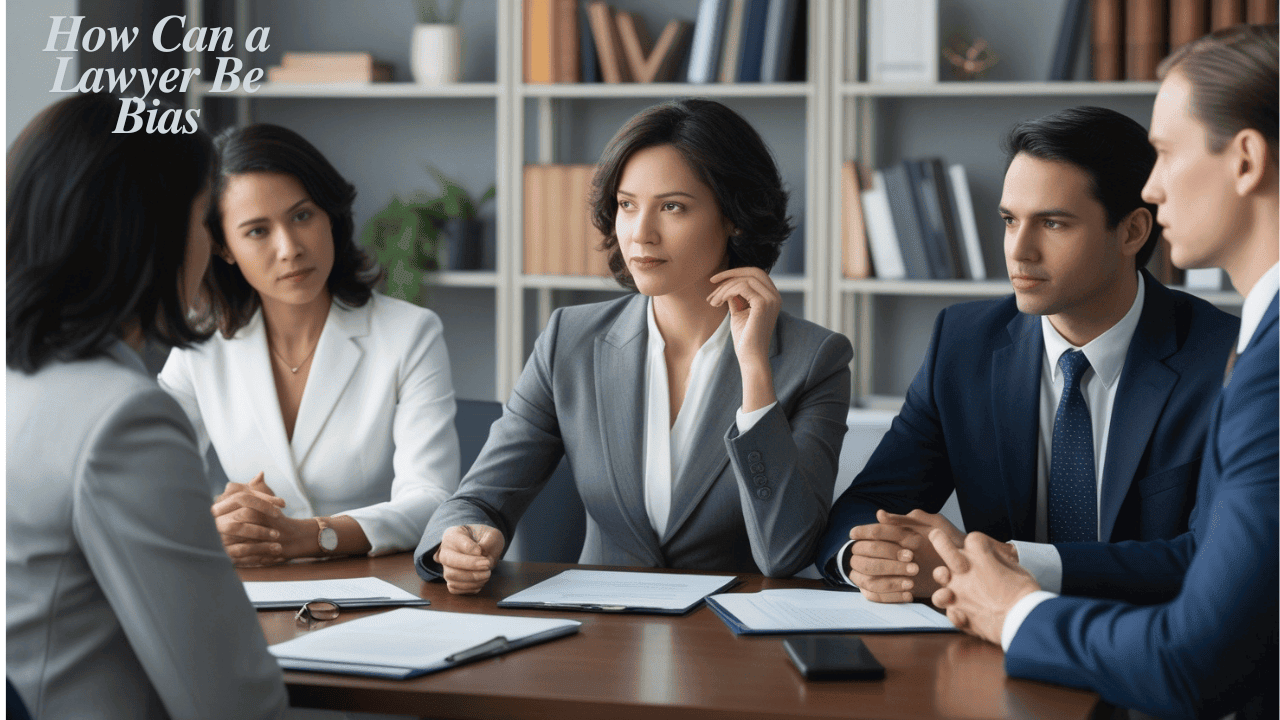In the realm of law, fairness is not just an expectation—it’s a necessity. However, the legal profession is not immune to human flaws, and one such flaw is bias. Bias in legal practice can undermine justice, erode trust in the judicial system, and leave clients feeling powerless. So, how can a lawyer be bias, and what steps can be taken to address this issue? This article delves into the causes, examples, and actions related to bias in the legal field.
What Does Bias in Law Mean?

Bias refers to an inclination or prejudice for or against a person, group, or idea, often in a way that is unfair. When it comes to lawyers, bias may manifest in subtle or overt ways, influencing their decision-making and the way they handle cases. Importantly, bias doesn’t always stem from malicious intent. Unconscious bias, driven by cultural, social, or personal factors, is just as impactful as intentional discrimination.
How Can a Lawyer Be Bias?
A How Can a Lawyer Be Bias can exhibit bias in several ways, ranging from unconscious favoritism to explicit discrimination. Here are some of the most common manifestations:
- Favoritism Towards Certain Clients: A lawyer may prioritize wealthy or influential clients over others.
- Prejudice Against Specific Demographics: This includes bias based on race, gender, ethnicity, or socioeconomic status.
- Judgment Based on Personal Beliefs: Lawyers may allow their political, religious, or social beliefs to influence their work.
- Bias in Evidence Interpretation: Selectively presenting or emphasizing evidence to favor one side over another.
Such behaviors can hinder justice and lead to significant consequences for both clients and the legal profession.
Examples of Lawyer Bias
Understanding bias becomes clearer with concrete examples. Let’s explore some scenarios where bias might occur:
Case Prioritization Based on Financial Gain
A How Can a Lawyer Be Bias may invest more effort into cases that promise higher financial returns, neglecting less lucrative cases. For example, a high-profile corporate case might receive more attention than a pro bono case for a marginalized individual.
Racial or Gender Bias
A How Can a Lawyer Be Bias might unconsciously assume a client’s credibility based on stereotypes, such as doubting a young woman’s ability to pay legal fees or assuming a person of color is guilty in a criminal case.
Reluctance to Defend Certain Clients
Personal values may prevent a lawyer from wholeheartedly defending a client. For instance, a lawyer with strong anti-drug sentiments might struggle to defend a client accused of drug-related crimes effectively.
Bias in Jury Selection
How Can a Lawyer Be Bias may select jurors who align with their personal beliefs, disregarding the broader need for a diverse and impartial jury.
Causes of Bias in Lawyers
To address bias, it’s crucial to understand its root causes. Bias in How Can a Lawyer Be Bias may arise due to:
- Cultural Conditioning: Societal norms and stereotypes can unconsciously shape attitudes.
- Professional Pressure: The high stakes of legal cases might lead lawyers to cut corners or rely on preconceived notions.
- Personal Experiences: Past interactions, both positive and negative, influence decision-making.
- Implicit Bias: Deep-seated, unconscious biases that individuals may not even realize they hold.
How Bias Impacts Justice
Bias in How Can a Lawyer Be Bias doesn’t just affect their clients; it ripples through the legal system. Here’s how:
- Unfair Representation: Clients may not receive the same level of diligence and care as others.
- Misjudgments: Biased interpretations of evidence or testimonies can lead to incorrect rulings.
- Erosion of Trust: A biased lawyer undermines public confidence in the legal system.
- Discrimination and Inequality: Bias perpetuates systemic issues and hinders progress toward equality.
Recognizing Bias in Legal Practice
Identifying bias can be challenging, as it often hides beneath the surface. Here are some signs to look for:
- Unequal attention or resources allocated to clients.
- Patterns of selecting or avoiding certain types of cases.
- Disparities in how arguments are presented in court.
- Implicit preference for or against certain groups during consultations.
Actions to Address Lawyer Bias
While bias may seem inevitable, there are proactive steps to minimize its impact:
Training on Implicit Bias
Mandatory training programs can help lawyers recognize and address unconscious biases.
Regular Self-Reflection
Encouraging lawyers to evaluate their decision-making processes can uncover areas of improvement.
Accountability Mechanisms
Establishing oversight bodies or committees ensures that biased behavior is identified and corrected.
Promoting Diversity in Law Firms
A diverse team fosters a broader range of perspectives, reducing the influence of individual biases.
How Clients Can Protect Themselves from Bias
Clients, too, have a role to play in addressing bias:
- Researching a Lawyer’s Reputation: Look for reviews or testimonials highlighting fairness and dedication.
- Seeking a Second Opinion: Consult multiple lawyers to find one who aligns with your needs.
- Asking Direct Questions: Don’t hesitate to ask about the lawyer’s approach and experience with similar cases.
The Ethical Responsibility of Lawyers
Legal professionals are bound by ethical codes that prioritize impartiality and justice. Bias violates these principles, jeopardizing the integrity of the legal profession. Addressing bias is not just about compliance; it’s about upholding the values that form the foundation of the legal system.
How Can Law Firms Combat Bias?
Law firms can adopt several measures to foster an unbiased work environment:
- Establishing Diversity and Inclusion Policies
- Conducting Regular Bias Audits
- Implementing Anonymous Case Reviews
- Creating Safe Spaces for Feedback
Legal Frameworks Addressing Bias
Many countries have How Can a Lawyer Be Bias and professional guidelines to combat bias in the legal profession. For example:
- Anti-Discrimination Laws: Enforce equal treatment for all clients.
- Professional Conduct Rules: Outline lawyers’ responsibilities to remain impartial.
- Ethical Oversight Committees: Investigate and address claims of bias.
The Role of Technology in Reducing Bias
Emerging technologies offer innovative ways to counteract bias:
- AI in Legal Research: Removes human bias in case analysis and evidence gathering.
- Data Analytics: Tracks patterns in lawyer performance to identify disparities.
- Virtual Reality Training: Offers immersive bias-awareness programs.
FAQs
How do unconscious biases affect lawyers?
Unconscious biases influence how lawyers perceive clients, cases, and evidence, often without realizing it. This can lead to unfair representation or decision-making.
Can a How Can a Lawyer Be Bias lawyer be disbarred?
Yes, severe or proven instances of bias that violate ethical guidelines can result in disciplinary action, including disbarment.
What is implicit bias training?
Implicit bias training helps individuals recognize and address subconscious prejudices, promoting fairness in professional interactions.
How can clients recognize a biased How Can a Lawyer Be Bias ?
Clients should look for unequal treatment, lack of attention, or reluctance to handle certain cases. Researching reviews and seeking second opinions can help.
Why is diversity important in the legal profession?
Diversity ensures a range of perspectives, reducing the likelihood of systemic bias and fostering equitable representation.
What are ethical obligations regarding bias for lawyers?
How Can a Lawyer Be Bias are ethically bound to provide impartial representation, uphold justice, and avoid any form of discrimination or favoritism.
Conclusion
How Can a Lawyer Be Biasin the legal profession is a challenge that demands attention from lawyers, clients, and the broader legal system. By acknowledging its existence, understanding its impact, and taking actionable steps to address it, the legal community can ensure justice remains fair and impartial. How Can a Lawyer Be Bias hold the power to influence society profoundly—eliminating bias is essential to fulfilling this responsibility.











